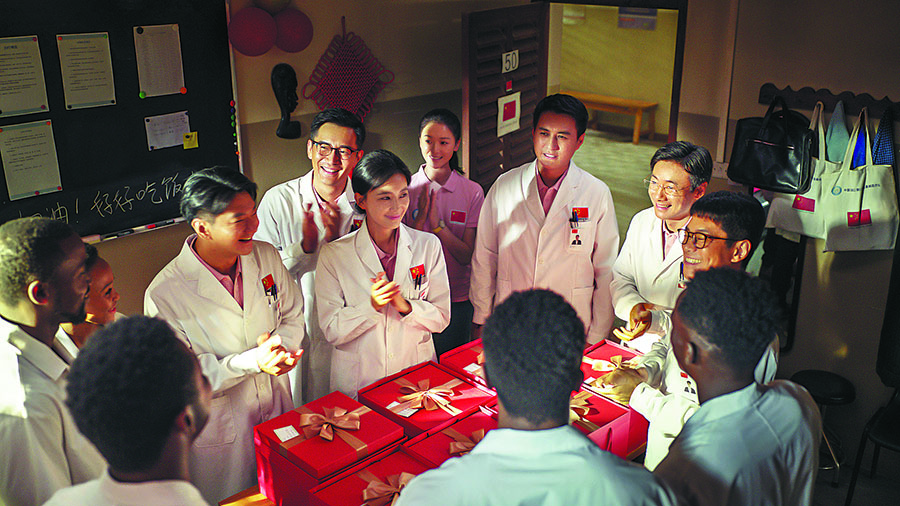

As most of the Chinese doctors are required to work at local hospitals for two years on regular shifts, they were quite willing to share plenty of funny stories, recalls Jin.
After seeking inspiration from more than 30 Chinese medical teams dispatched to other African countries, including Mali, Senegal, and Sierra Leone, as well as conversations with local Chinese entrepreneurs, the script took form earlier this year, and filming was conducted between April and August.
Recruiting more than 1,400 foreign actors, the film was shot domestically in Hainan and Zhejiang provinces and in the archipelago of Zanzibar and the city of Dar es Salaam in Tanzania. The Arusha National Park and the Serengeti National Park — landmarks of Tanzania — also feature in the TV series.
Around 100 scenes are inspired by real-life cases, such as African patients preferring to take acupuncture as a form of treatment and Chinese doctors growing vegetables in their own yards to increase options for the dining table.
As China and Tanzania have had a decades-long friendship since the two countries established diplomatic relations in the early 1960s, the TV series has gained a lot of support from Tanzanian authorities. For instance, they once filmed a plot line about Chinese doctors urgently shifting a patient struggling with cerebral malaria to a larger hospital, but unfortunately being hampered by a traffic jam caused by a marathon race with 10,000 runners.
The scene, which recruited around 1,200 extras and used 100 vehicles, was shot at a busy crossroads in Zanzibar. Jin recalls the crew had obtained permits in advance from authorities, including public security and tourism. The police officer who was in charge was helpful and friendly, and the local actors were also supportive, he adds.
The TV series features acclaimed actors Jin Dong and Zu Feng, along with actress Zhang Yuqi, in the roles of doctors. Additionally, the cast includes Kawawa Kadichi, a Zambian actor who speaks fluent Mandarin with a slight Shaanxi accent, portraying the protagonist's student.
The crew also built an "African hospital", covering an area of 7,000 square meters, and two "villages" for shooting in Wanning in South China's Hainan province, and made 100,000 props and 10,000 costumes.
Interestingly, the TV series uses the names of actual Chinese doctors deployed to Africa for some of its characters. Examples include Chang Lai, a surgeon from Taixing in Jiangsu province, who was dispatched to Tanzania, and Sun Shuang, a respiratory physician of traditional Chinese medicine from Hunan province, who was assigned to Zimbabwe, according to Liang.
He also mentioned that Milele, a fictional village in the title of the drama where the protagonist and his fellow medical team members reside, is inspired by the Swahili word for "forever", as he wishes to convey a lasting friendship between China and Africa.
According to the National Health Commission, China has deployed more than 30,000 medical personnel to 76 countries and regions, helped with the establishment of more than 130 medical and healthcare facilities, and provided medical care to nearly 300 million patients over the past 60 years.
Citing the statistics, Liang says that creators of the television drama view it as both a responsibility and a mission to depict the determination and dedication of Chinese doctors, particularly after all their experience in Africa, gaining a profound understanding of the efforts of generations of Chinese medical teams to assist local patients, as well as the sentiments of Africans toward the Chinese.